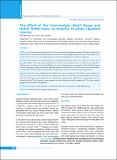Please use this identifier to cite or link to this item:
https://hdl.handle.net/20.500.14356/1362| Title: | The Effect of the Intercondylar Notch Shape and Notch Width Index on Anterior Cruciate Ligament Injuries |
| Authors: | Basukala, Bibek Joshi, Amit Pradhan, Ishor |
| Citation: | BasukalaB., JoshiA., & PradhanI. (2020). The Effect of the Intercondylar Notch Shape and Notch Width Index on Anterior Cruciate Ligament Injuries. Journal of Nepal Health Research Council, 17(4), 532-536. https://doi.org/10.33314/jnhrc.v17i4.1858 |
| Issue Date: | 2019 |
| Publisher: | Nepal Health Research Council |
| Article Type: | Original Article |
| Keywords: | Anterior cruciate ligament Injury Notch |
| Series/Report no.: | Oct-Dec, 2019;1858 |
| Abstract: | Abstract Background: Anterior cruciate ligament is one of the commonly injured ligaments in knee. The shape and dimension of the femoral notch has been linked with the risk of anterior cruciate ligament injury. The aim of this study was to study the risk of Anterior cruciate ligament injury with notch morphology in the Nepalese population. Methods: This study is a case control study. Cases undergoing arthroscopic surgery at 2 tertiary level centers were enrolled. Patients with arthroscopic confirmation of Anterior cruciate ligament tear were taken as case and those without tear were taken as control. Axial Magnetic resonance Imaging sequence was used to study notch. Sections at the level of popliteal groove was taken for study and shapes were identified as A, U and W type, and notch width index was calculated. These variables were correlated with presence or absence of Anterior cruciate ligament tear. Results: Out of 118 cases, 59 had tear, and 59 had no tear. Tear was found in 74% of Type A notch compared to 30.15% in Type U notch. The femoral notch width index was low in 42.59% of A type notch patients compared to 20.63% with U type notch. Analysis of notch width index among patients with Anterior cruciate ligament tears, showed that 40.67% of Anterior cruciate ligament torn knee had narrow notch compared to 22% in non- injured group, which was statistically significant. Conclusions: Type A notch and narrow notch both are risk factors for Anterior cruciate ligament tear. Keywords: Anterior cruciate ligament; injury; notch. |
| Description: | Original Article |
| URI: | http://103.69.126.140:8080/handle/20.500.14356/1362 |
| ISSN: | Print ISSN: 1727-5482; Online ISSN: 1999-6217 |
| Appears in Collections: | Vol. 17 No. 4 Issue 45 Oct-Dec 2019 |
Files in This Item:
| File | Description | Size | Format | |
|---|---|---|---|---|
| 1858-Manuscript-13242-1-10-20200121.pdf | Fulltext Download | 1.32 MB | Adobe PDF |  View/Open |
Items in DSpace are protected by copyright, with all rights reserved, unless otherwise indicated.
